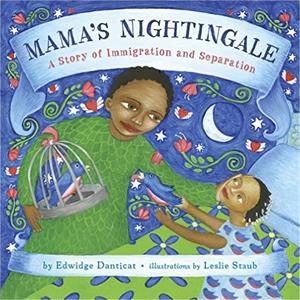Mama’s Nightingale: A Story of Immigration and Separation. Edwidge Danticat. Ill. Leslie Staub. 2015. Penguin/Dial.
Ages 7–18
Summary
 Edwidge Danticat’s words and Leslie Staub’s vibrant images combine in Mama’s Nightingale: A Story of Immigration and Separation to tell the story of Saya, a young girl whose mother, a Haitian immigrant, has been imprisoned because she is undocumented. Saya’s father petitions the local mayor, congresswoman, and news outlets for support in bringing his wife home, to no avail. No one ever responds.
Edwidge Danticat’s words and Leslie Staub’s vibrant images combine in Mama’s Nightingale: A Story of Immigration and Separation to tell the story of Saya, a young girl whose mother, a Haitian immigrant, has been imprisoned because she is undocumented. Saya’s father petitions the local mayor, congresswoman, and news outlets for support in bringing his wife home, to no avail. No one ever responds.
During this time of separation, Saya’s mother begins recording bedtime stories and mailing them to Saya to help maintain their connection. In particular, she tells a story about a nightingale who goes on a long journey to return home to her baby, paralleling her desire to return home to her own child. One day, as Saya watches her father write yet another letter on his wife’s behalf, she decides to write her own letter to share her story. Instead of the silence Saya’s father’s letters elicited, Saya receives a response almost immediately, first from one reporter, then another. Soon after, members of the community send their own letters and make calls advocating for Saya’s family. After only one week, Saya’s mother is brought before a judge who rules that she may go home to her family while she awaits her papers.
Cross-Curricular Connections
English/language arts, social studies/history
Ideas for Classroom Use
Analyze Nonprint Texts
The rich illustrations found in quality picture books offer opportunities for students to analyze nonprint texts. Students can examine the book’s illustrations, identifying elements that help to reveal character, underscore the author’s message, and symbolize big ideas and explaining how these elements help to convey the story. Students may also comment on visual motifs such as the key, the nightingale, and the rainbow.
Determine Theme and Write Thematic Statements
Picture books like this one are a great way to introduce students to the skills of identifying theme and writing thematic statements. Saya herself says, “It is our words that brought us together again.” How do the writer’s words help to convey her message?
Write to Persuade
Saya’s story demonstrates that every child has the power to make a difference. Individually, students can explore a cause meaningful to them, research the cause, and then write to a local leader advocating for their cause. Collectively, students might develop a campaign for a cause of their choosing.
Research the Effects of Immigration and Separation
The author herself grew up in a family that experienced separation caused by immigration, and the topic of immigration continues to be a part of national and international discussions. All students can learn more about the human side of immigration, and older students can examine the role immigration will play in the 2016 U.S. presidential election.
Additional Resources
U.S. Immigrations and Customs Enforcement (ICE) website has information about the U.S. Department of Homeland Security, including data on the number of people deported, detained, or both each year.
Edwidge Danticat’s “Stories of Haiti”TED Talk in which the author shares her wealth of knowledge about Haiti’s culture and people.
Laren Hammonds has been a classroom teacher since 2004, working with students in grades 7–12. She currently spends her workdays with eighth graders at Rock Quarry Middle School in Tuscaloosa, AL, and every other moment reading books and seeking out adventures with her preschool son Matthew and husband Erik. A two-time graduate of the University of Alabama, she holds a master’s degree in instructional technology and is currently pursuing National Board Certification. Her professional interests include the intersection of video games and literacy, cross-curricular collaboration in secondary schools, preservice teacher support, and the impact of classroom design on student learning. Find her on Twitter and Instagram.